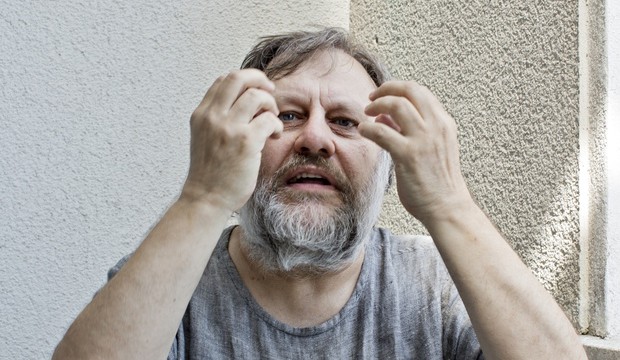Slavoj Zizek är en av vänsterns ledande intellektuella, en slovensk kommunist förankrad i både marxism och kontinental filosofi. Han har inte sällan tangerat det heterodoxa, men den senaste tiden har han hamnat i hetluften efter att ha kritiserat de krav på ”öppna gränser” stora delar av vänstern gjort till sina. Vi har i flera artiklar på bloggen skisserat en möjlig vänsterkritik av de öppna gränserna som ideal och ersättandet av internationalism med antinationalism, det är i stort sett denna vänsterkritik Zizek företräder.
Klassfrågor eller moralism
For instance, the right to “free movement” should be limited, if for no other reason than the fact that it doesn’t exist among the refugees, whose freedom of movement is already dependent on their class.
– Zizek
Zizek utgår från klassanalys snarare än moralism. Han är medveten om att migranter inte sällan haft möjlighet att ta sig till Europa som följd av att de tillhör lokal medelklass. Lokal underklass har inte alltid samma möjligheter. Han är också medveten om att angreppen på ”främlingsfientliga” ofta har ett inslag av klassförakt, det riktas mot infödd arbetarklass. Lösningen för Zizek är dock inte nationalism eller klassamarbete, utan närmande mellan ”vår” och ”deras” arbetarklass.
Zizek identifierar också en ideologisk tendens. Fokus på ”flyktingar” och ”humanism” ersätter fokus på emancipatorisk klasskamp. Det första är förenligt med liberalismen, det senare är det inte. Zizek skriver:
In the first half of 2015, Europe was preoccupied by radical emancipatory movements (Syriza and Podemos), while in the second half the attention shifted to the “humanitarian” topic of the refugees. Class struggle was literally repressed and replaced by the liberal-cultural topic of tolerance and solidarity.
Geopolitisk analys
The anti-immigrant populist also knows very well that, left to themselves, people in Africa and the Middle East will not succeed in solving their own problems and changing their societies. Why not? Because we in Western Europe are preventing them from doing so. It was Western intervention in Libya that threw the country into chaos.
– Zizek
Den pågående folkvandringen kan inte betraktas isolerat. Zizek kopplar den till vårt globala ekonomiska system, kapitalismen, och till de ”interventioner” som förstört land efter land (Syrien, Libyen, Irak, et cetera). The ongoing disorder should be treated as the true face of the New World Order, skriver Zizek. Hans analys är antiimperialistisk, den knyter också an till analyser av massmigrationen som orkestrerad:
The fact that refugees are in a desperate situation in no way excludes the fact that their flow into Europe is part of a well-planned project.
Zizek menar att lösningen är ett annat globalt system.
Norge finns inte
The more Western Europe will be open to them, the more it will be made to feel guilty that it did not accept even more of them. There will never be enough of them.
– Zizek
I en fascinerande formulering konstaterar Zizek att Norge inte finns. Han avser med ”Norge” den utopiska fantasi en del migranter drivs av, ett land där man kan leva precis som man gjorde i hemlandet fast mycket bättre. Här blir Zizek politiskt inkorrekt:
Refugees who want to reach Norway present an exemplary case of ideological fantasy — a fantasy-formation that obfuscates the inherent antagonisms. Many of the refugees want to have a cake and eat it: They basically expect the best of the Western welfare-state while retaining their specific way of life, though in some of its key features their way of life is incompatible with the ideological foundations of the Western welfare-state.
Han vänder sig mot talet om ”tolerans”, när sådan tolerans innebär oförmåga att identifiera och försvara de normer som får våra samhällen att fungera. Alternativet är att vi accepterar framväxten av misogyna och homofoba miljöer, samtidigt som de infödda vänder sig till populister (vilka Zizek egentligen ser som det större hotet). We must abandon the notion that it is inherently racist or proto-fascist for host populations to talk of protecting their ‘way of life’ skriver Zizek.
Zizek försvarar de emancipatoriska värden som idag gärna förknippas med ”eurocentrism” (bland annat jämlikhet och välfärdsstaten). Han tar också upp den kontraproduktiva moralism som ofta är ”anti-rasismen” och ger de omfattande övergreppen på infödda flickor i Rotherham som exempel på vad det leder till. Här blir Zizek återigen synnerligen politiskt inkorrekt:
We should approach the Rotherham events in exactly the same way since we are dealing with the “political unconscious” of Pakistani Muslim youth. The kind of violence at work is not chaotic violence but ritualized violence with precise ideological contours. A youth group, which experiences itself as marginalized and subordinated, took revenge at low-class girls of the predominant group. It is fully legitimate to raise the question of whether there are features in their religion and culture which open up the space for brutality against women without blaming Islam as such (which is in itself no more misogynistic than Christianity).
Zizek försvarar också gränser, och någon form av ordning. Man kan möjligen identifiera en brist på stadga i hans resonemang, de har en flytande, prövande, karaktär. Men som helhet finns här mycket av värde både för en vilsen vänster och för populister i gemen. För egentligen är öppna gränser liberal moralism snarare än vänster i någon historisk mening av ordet, och atlanticister ett större problem för Europa än muslimer.
Vi läser Zizeks artiklar här:
In the Wake of Paris Attacks the Left Must Embrace Its Radical Western Roots
The Non-Existence of Norway
The greatest hypocrites are those who call for open borders. They know very well this will never happen: it would instantly trigger a populist revolt in Europe. They play the beautiful soul, superior to the corrupted world while continuing to get along in it.
– Zizek











